|
|
|
|
It’s been almost three years since the horrific van attack on Toronto’s Yonge Street that left 10 people dead and 16 injured. This week, a verdict was reached in the case against the attacker. Despite entering a plea of not criminally responsible — which had advocates concerned about the potential backlash and further stigmatization of people with autism — Alek Minassian was found guilty of 10 counts of first-degree murder and 16 counts of attempted.
Today, in The Conversation Canada, York University’s Jack Rozdilsky and Edward Snowden write about the implications of the case for ideologically motivated attacks. “While Minassian was held criminally responsible for his action, the trial did not involve terrorism charges, despite the terrorist-like use of a vehicle as a weapon,” they write.
Also today:
All the best.
|
Nehal El-Hadi
Science + Technology Editor
|

|
|
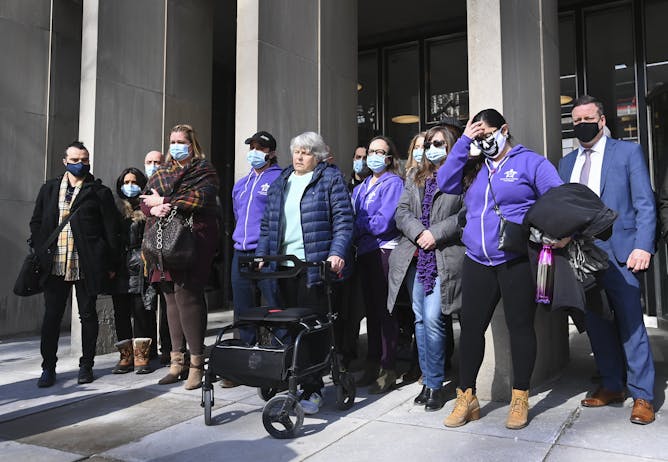
Survivors and victims, along with their family and friends, share a moment outside the courthouse after Alek Minassian had been found guilty for the Toronto van attack.
THE CANADIAN PRESS/Nathan Denette
Jack L. Rozdilsky, York University, Canada; Edward Snowden, York University, Canada
The judgment document in the Toronto van attack case pointed out that the attacker's motivations were unclear but related to other ideologically informed violent acts.
|

Pandemic control measures have meant that people have shifted to working from home, but this creates new cybersecurity threats.
(Shutterstock)
Michael Parent, Simon Fraser University
The coronavirus pandemic has meant homes rather than offices have become workplaces. Companies need to respond to these new cybersecurity threats.
|

People protesting the gang rape and killing of a woman in Hathras, Uttar Pradesh, hold onto each other as policemen try to detain them in New Delhi, India, in September 2020. The gang rape of the woman from the lowest rung of India’s caste system sparked outrage across the country.
(AP Photo/Altaf Qadri)
Deeplina Banerjee, Western University
Because of its extreme violence, the Hathras rape sent shock waves throughout India: it is a disturbing reminder of the normalization of rape culture there and should be seen as a call to action.
|
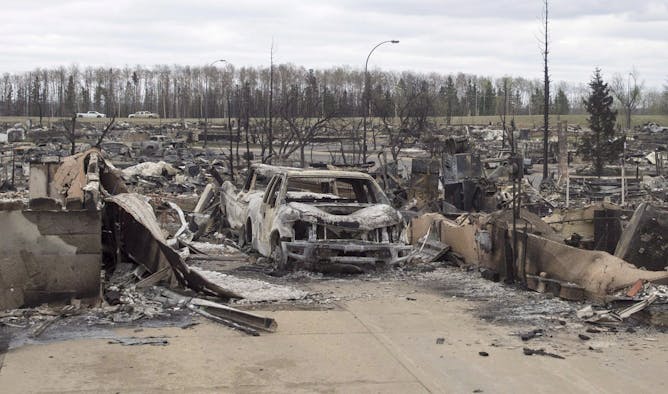
As climate change brings longer and drier summers, Canadians will face greater risks of more serious wildfires, like those that tore through neighbourhoods in Fort McMurray, Alta., in May 2016.
THE CANADIAN PRESS/Ryan Remiorz
Sarah Sharma, Queen's University, Ontario; Matthew Hoffmann, University of Toronto
Governments must expand the number of people who see themselves as "winners" in the transition to a low-carbon society.
|
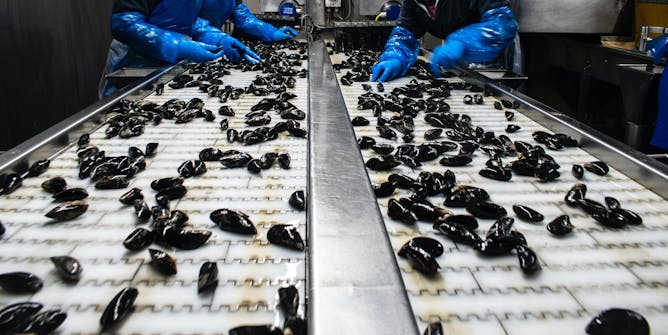
The health and well-being of temporary foreign workers in the seafood industry in Atlantic Canada are disregarded in favour of business and economic concerns.
(Paul Einerhand/Unsplash)
Raluca Bejan, Dalhousie University; Kristi Allain, St. Thomas University (Canada)
Debates about public safety and temporary foreign workers continue without input from those whose health is most affected. Migrant workers themselves are largely invisible amid discussions about risk.
|
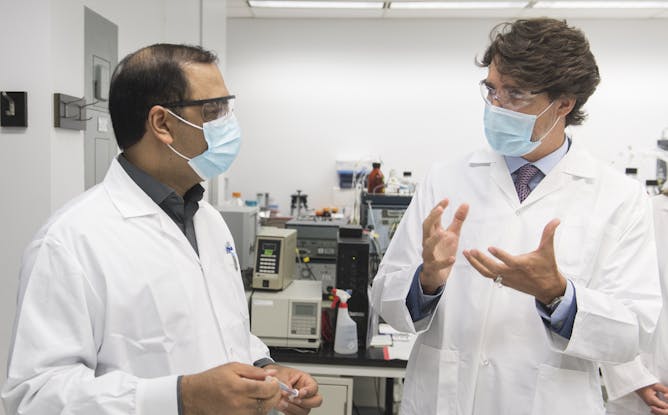
Prime Minister Justin Trudeau, right, speaks with scientist Krishnaraj Tiwari at the National Research Council of Canada (NRC) Royalmount Human Health Therapeutics Research Centre facility in Montreal, Aug 31, 2020.
THE CANADIAN PRESS/Graham Hughes
Sarrah Lal, McMaster University; Jeremy Hirota, McMaster University; Milica Vukmirovic, McMaster University
To continue the fast-paced collaborative research and innovation we have seen during the pandemic, here are five ways universities can support health research that responds to societal needs.
|
La Conversation Canada
|

L’eau dévale du barrage hydroélectrique Carillon au Québec.
LA PRESSE CANADIENNE/Ryan Remiorz
Brett Dolter, University of Regina; Blake Shaffer, University of Calgary; G. Kent Fellows, University of Calgary; Nicholas Rivers, L’Université d’Ottawa/University of Ottawa
Le secteur de l’électricité jouera un rôle clé dans la réduction des gaz à effet de serre. Améliorer le transport sur de longues distances permettrait de distribuer une énergie propre à moindre coût.
|
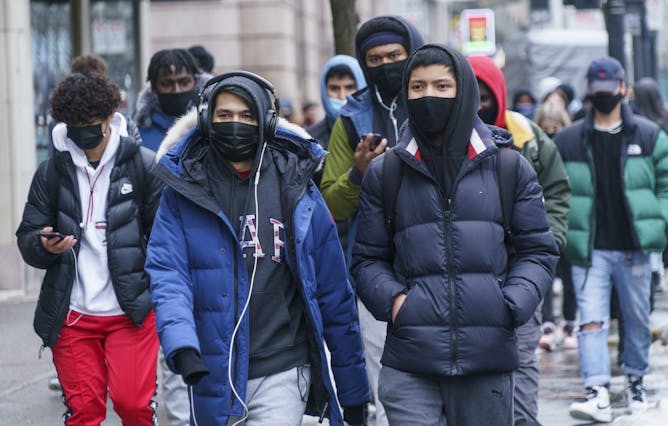
De jeunes acheteurs font la queue pour l'ouverture d'un magasin de vêtements le vendredi noir à Montréal, le vendredi 27 novembre 2020.
LA PRESSE CANADIENNE/Paul Chiasson
Christian J. Y. Bergeron, L’Université d’Ottawa/University of Ottawa
Nous devons favoriser le dialogue avec la jeunesse québécoise francophone, anglophone et allophone et l’accompagner dans cette découverte de la richesse de la langue française.
|
The Conversation Weekly
|
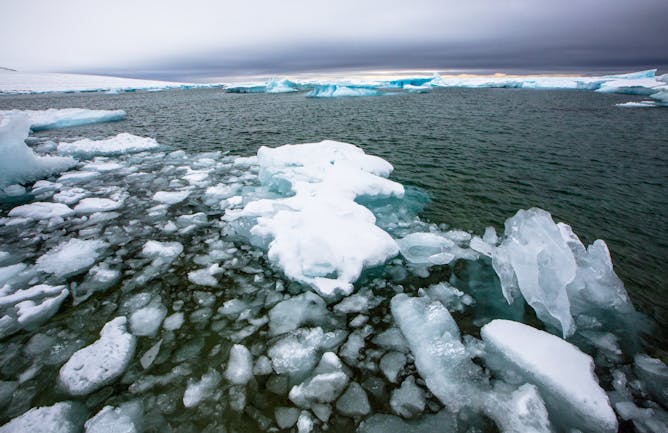
The Arctic is warming two to three times faster than any other place on Earth.
Kevin Xu Photography via Shutterstock
Gemma Ware, The Conversation; Daniel Merino, The Conversation
Plus, new discoveries about early humans in Tanzania's Olduvai Gorge. Listen to episode 5 of The Conversation Weekly podcast.
|
Business + Economy
|
-
Luke Heemsbergen, Deakin University
The digital tokens are a way to create scarcity and an aura of authenticity in an online world of infinite copying, pasting and remixing.
|
|
Arts
|
-
Heather Green, Nottingham Trent University
The closure of physical buildings doesn't have to mean that new readers should miss out on literary history
|
|
Science + Technology
|
-
Christopher Hand, Glasgow Caledonian University
People appear to victim-blame celebrities for the abuse they suffer on Twitter.
|
|
| |
| |
| |
| |

|
| |
| |
| |
| |
| |
| |
| |
| |
|
|
|
|
|
|
|